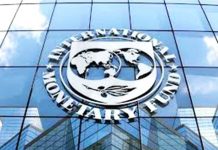As inflation continues to decelerate, the Bank of Ghana has decided to maintain its monetary policy at 30%.
This is the second consecutive time it has maintained the rate.
The Monetary Policy Committee (MPC) of the bank finds the need to keep the policy rate tighter for longer until inflation is firmly anchored on a downward trajectory towards the medium-term target.
Addressing the media yesterday, the Governor of the Bank of Ghana, who is also the Chairman of the Committee, Dr. Ernest Addison, said headline inflation has continued to decelerate in the past few months, consistent with forecasts.
He continued, “The latest Bank forecast indicates that the disinflation process is expected to continue, supported by the current tight monetary policy stance, a relatively stable exchange rate, and base drift effects.”
He further explained that all the core measures of inflation and inflation expectations are pointing downward, and the Bank will remain vigilant on the risks to the disinflation process.
Mr. Addison emphasised that the Committee noted that tighter financing conditions, slower growth in the manufacturing and services sectors, and China’s slower recovery were exerting some moderating influence on global economic activity.
“Earlier aggressive policy tightening by advanced economies central banks has contributed to the dampening of inflationary pressures, with headline inflation decelerating in many of their economies.
“This has led to a pause in the tightening cycle. But core inflation remains high and is declining slowly due to strong labourmarkets,” he noted.
In the outlook, the Chairman disclosed that the central banks are expected to maintain policy rates at high levels for much longer periods to contain the still-elevated inflation levels relative to targets.
The prevailing higher policy rates, long-term bond yields, and renewed strength of the US dollar, he bemoaned, could continue to keep global financing conditions tight, with consequences for emerging markets and developing economies.
Furthermore, rising geopolitical tensions are creating uncertainty about crude oil prices, and the full crystallisation of this risk could undermine the disinflation process in many economies, including Ghana.
On the domestic macroeconomic environment, he stated that the Committee observed broad improvements in the economy, reflecting stable exchange rates, the sustained disinflation process, and increased accumulation of foreign exchange reserves.
These developments, he reiterated, reflect improvements in underlying policies, including fiscal consolidation, zero financing of the budget by the central bank, and relatively favourable external conditions.
On growth, the governor admitted that domestic economic activity continues to recover, as evidenced by the steady improvement in the bank’s high-frequency economic indicators.
“The CIEA is recovering from negative territory and is likely to turn positive by year-end, showing a more solid rebound in economic activities. Both business and consumer sentiments remain largely stable. Private sector credit growth, however, remains dampened due to risk aversion by banks amid tightened policy conditions and rising credit risk,” he added.
However, with continued improvement in macroeconomic conditions supported by declining inflation, Dr. Addison pointed out that credit conditions are expected to improve with a turnaround in credit extensions to support growth.
Meanwhile, the external payment position is expected to improve, underpinned by continuous implementation of the IMF-supported programme, and the Gold for Reserves programme, among others.
He told the media that the early completion and settlement of favourable agreement terms with bilateral creditors and commercial bondholders will help boost confidence and trigger resource flows to the economy.
Also, Dr. Addison admonished that the strong buildup in reserves has provided a cushion against external vulnerabilities, including the delay in the cocoa syndicated loan.
He is optimistic that the reserve build-up will even be stronger by the end of the year on receipt of the cocoa loan and disbursement of the IMF second tranche.
This, he indicated that sustained fiscal consolidation will be needed to place the economy firmly on the course of disinflation and economic growth.
“The implementation of the budget thus far has been strong, reflecting the attainment of fiscal targets under the programme for the first view,” Dr. Addison said.









